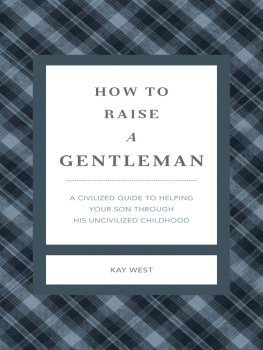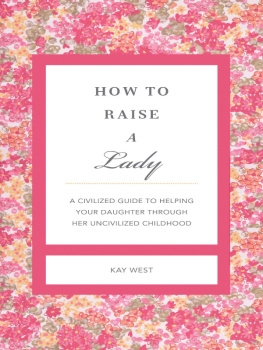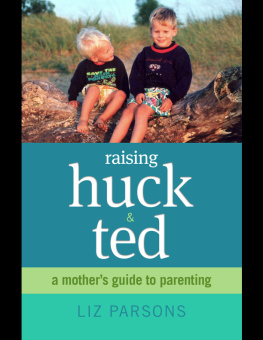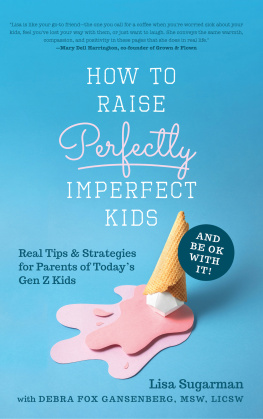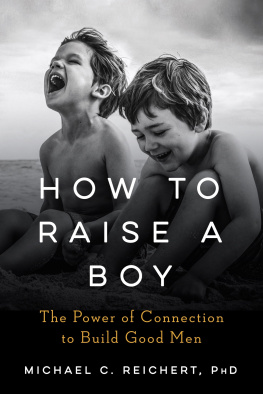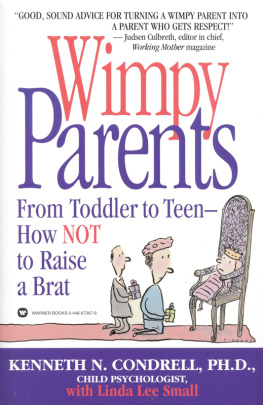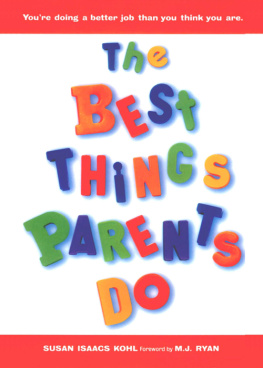
HOW TO
RAISE
A
GENTLEMAN
OTHER GENTLEMANNERS BOOKS
How to Be a Gentleman
John Bridges
A Gentleman Entertains
John Bridges and Bryan Curtis
As a Gentleman Would Say
John Bridges and Bryan Curtis
A Gentleman Gets Dressed Up
John Bridges and Bryan Curtis
A Gentleman Walks Down the Aisle
John Bridges and Bryan Curtis
Toasts and Tributes
John Bridges and Bryan Curtis
50 Things Every Young Gentleman Should Know
Kay West with John Bridges and Bryan Curtis
50 Things Every Young Lady Should Know
Kay West with John Bridges and Bryan Curtis
How to Be a Lady
Candace Simpson-Giles
As a Lady Would Say
Sheryl Shade
How to Raise a Lady
Kay West
A Lady at the Table
Sheryl Shade with John Bridges and Bryan Curtis
A Gentleman at the Table
John Bridges and Bryan Curtis
A Gentleman Abroad
John Bridges and Bryan Curtis
HOW TO
RAISE
A
GENTLEMAN
REVISED AND EXPANDED
......................................................
A CIVILIZED GUIDE TO HELPING
YOUR SON THROUGH
HIS UNCIVILIZED CHILDHOOD
KAY WEST

2001, 2012 by Kay West
All rights reserved. No portion of this book may be reproduced, stored in a retrieval system, or transmitted in any form or by any meanselectronic, mechanical, photocopy, recording, scanning, or otherexcept for brief quotations in critical reviews or articles, without the prior written permission of the publisher.
Published in Nashville, Tennessee, by Thomas Nelson. Thomas Nelson is a registered trademark of Thomas Nelson, Inc.
Thomas Nelson, Inc., titles may be purchased in bulk for educational, business, fund-raising, or sales promotional use. For information, please e-mail SpecialMarkets@ThomasNelson.com.
ISBN: 978-1-40160-461-5
The Library of Congress has cataloged the earlier edition as follows:
West, Kay, 1955
How to raise a gentleman / Kay West.
p. cm.
ISBN 10: 1-55853-940-9
ISBN 13: 978-1-55853-940-2
1. Child rearing. 2. Etiquette for children and teenagers. 3. Etiquette for boys.
I. Title.
HQ769 .W446 2001
649.132dc21
2001004338
Printed in the United States of America
12 13 14 15 16 WOR 6 5 4 3 2 1
For my parents, who taught
me manners; For my children,
who taught me parenting;
And to RRT, for the rest
CONTENTS
ix
M oments after your newborn sons squalling entry into the world, he will be weighed, measured, and take his first test, the APGAR, an evaluation of his physical condition. A high score is a relief, but not necessarily reason to download an application to Harvard or run out and buy a batting cage.
In this competitive world, parents scrutinize their sons every move or passing interest for signs that he might be gifted in some fieldif his crayon scribble suggests a superior understanding of proportion and perspective; if his sturdy frame portends a future NFL running back; if his skill at assembling Lego structures predicts a budding architect.
With the goal of identifying and nurturing a unique talent or special skill, young boys are enrolled in art classes, signed up for peewee football, and immersed in technology and accelerated learning programs. But sometimes in the drive to help our sons succeed, we skip over the one thing that every single boy has the potential to achieve: good manners.
x
Among the hundreds of expenses that constitute the soaring costs of raising a child from conception to graduation, the development of manners is the least costly. In fact, it is absolutely free. And the bonus is that teaching your son good manners is the one investment you can make with guaranteed returns. He may be trilingual by the time hes in second grade, but if he doesnt say "please" and "thank you" in at least one language, he is at a disadvantage among those who do. He may be able to sketch an impressive self-portrait, but if he doesnt write a thoughtful thank-you note to the family who took him to the beach for a week, he probably wont be asked again. He may have the highest batting average on his Little League team, but if he berates a teammate who strikes out, the coach wont think much of his leadership potential.
Good manners are born from common courtesy and common courtesy is quite simple. Courtesy is based on respect, civility, kindness, and consideration. It is being mindful of others, whether you are in their presence or not. Courtesy walks hand in hand with good manners, and both are the embodiment of the Golden Rule: Do unto others as you would have them do unto you.
Young gentlemen spring forth from any well; blue-blooded breeding does not always lead to blue-ribbon manners. Princes-in-waiting may be more accustomed to fine dining than boys raised on a pig farm, but familiarity with place settings and the proper use of forks is less valuable than kindness and the proper use of please and thank you.
xi
Good manners begin with the assimilation of the examples set for a boy by his parents. How to Raise a Gentleman is a book for parents who want to do the right thing but may need a few pointers. This is not a book of formal etiquette but a guide to good manners supported by a commonsense collection of real-life advice, time-tested tips, and lessons learned. Ideally, this instruction manual will prove to be as helpful for parents as it is for sons.
Good manners will open more doors, charm more acquaintances, and make more memorable first impressions than French, art, and golf lessons combined. The basics can be acquired in toddlerhood and, with daily application, will last a lifetime. It is never too soon to begin or too late to catch up.
xiii
26 THINGS TO REMEMBER
Use please, thank you, and excuse me. Always.
Wait your turn.
Be generous with compliments and stingy with criticism.
Listen to your child when he speaks to you, even if youve heard it before.
Do not discipline your child in front of others.
Do not correct any child, other than your own, on his manners, and always do that privately.
Be clear about what you expect.
Be consistent.
xiv
Do not give in to temper tantrums.
Do not lose your temper.
Admit when you are wrong. Offer an apology when you owe one.
Let your child know when a discussion has become a decision.
Words can hurt. Do not hurl them about as weapons.
Respect your childs privacy and boundaries. Knock first.
Do not impose your ideology, and respect those whose ideology differs from your own.
Agree to disagree.
Give credit where credit is due.
Hold the door.
Lend a hand.
Be a good sport.
Be a gracious loser and a generous winner.
Give more than you are asked.
Dont take more than you need.
Leave a place cleaner than you found it.
Do not respond to rudeness with rudeness.
Winning is not the only thing, and nice guys do finish first.
A fter Mama and Papa, the very next word in your sons vocabulary will likely be no. In the early stages using the word no typically does not indicate rudeness but rather a self-satisfied delight in finding a means to communicate displeasure other than crying, screaming, or squalling. It is also an easier word for tiny mouths to form than the more agreeable and pleasant yes. As your boys vocabulary expands, he will begin to communicate his wants and needs. This is the time to introduce the two magic words: please and thank you.
Next page
